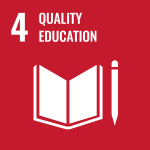Sustainable Food Systems Progress
Learn about what Concordia is doing to achieve its 2025 sustainable food targets.
CONCORDIA'S FOOD ENVIRONMENT
Nine Concordia Food Services-run locations:
Contracted Aramark to manage the two dining halls plus 6 retail locations (LB Café, Starbucks, AD Café, SP Café, Hingston Café and Stingers Cafe in the Hall building); the contract began in 2022 and ends in 2026, with an option for a two-year extension.
Concordia Food Services also works with an independent food vendor for one of its locations (Vinh’s in the JMSB building).
Twenty food tenants (all located on SGW campus):
- Al-Taib (ET), Jugo Juice (EV), Matcha Zanmai (EV), Van Houtte (EV), Second Cup (FB), The Alley (FB), A&W (GM), Biryani (GM), Cocobun (GM), Dairy Queen (GM), Ins Market (Kandju) (GM), Java U (GM), M. Gao (GM),, Noix C Sante (GM), Pizza Bella (GM), Thai Express (GM), Tim Hortons (GM), Sushi Shop (MB), Al-Taib (MK)
Three student-run café/bars:
- The Hive Café Solidarity Co-op (SGW and Loyola); Reggie’s Co-op
Two student-run soup kitchens:
- People’s Potato (SGW); Hive Free Lunch (LOY)
Six student-run initiatives that either grow produce, sell produce or sell/offer groceries:
- CultivAction; Sankofa, Concordia Farmer’s Market; mind.heart.mouth; People’s Potato Garden, Emergency Food Baskets and Le Frigo Vert
Eight student-run initiatives that provide support & advocacy services related to food systems:
- Sustainable Concordia; Sustainability Action Fund; Concordia Student Union; Graduate Students Association; Concordia Food Coalition; Centre for Gender Advocacy; Q-PIRG Concordia
FOOD PROCUREMENT
Target: Increase sourcing of local / sustainable foods to 50% of total purchases in the summer and fall and 40% in the winter and spring
Status
- Complete
Efforts supporting this target
With the food service provider, opportunities were identified to increase local and Fairtrade purchasing such as sourcing local frozen strawberries, granola and Fairtrade spices as well as integrating more Quebec produce in the winter menu.
Concordia Food Services started working with a new local farmer to provide some of the produce that were difficult to source locally in 2022-23.
Concordia was recognized by Aliments du Quebec au menu with a Coup de Coeur award for the university’s outstanding efforts to promote and integrate local Quebec foods into campus dining.
Calls to action
- Learn more about Concordia’s commitment to local and sustainable food
Related Sustainable Development Goal
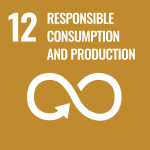
AGREEMENTS MEASURES & METRICS
Target: Ensure that environmental and social sustainability is factored into all tenders/agreements/contracts concerning the food system
Status
- Complete
Efforts supporting this target
| Tender/ Agreement /Contract | How environmental and social sustainability is factored into the tender/agreement/contract |
|---|---|
| Food Service Contract | The new food service contract requires the provider to meet Concordia’s Sustainability Action Plan’s local, sustainable food and animal protein purchasing targets as well as support Concordia’s Fair Trade Silver Campus objective. The contract also includes the option to impose a financial penalty if the provider cannot justify a failure to meet their sustainability targets. |
| Catering contract | The catering contract requires caterers to offer Fairtrade coffee, tea and sugar and to provide at least one-plant based milk for coffee service. Single-use plastic water bottles, plastic tablecloths and individually packaged condiments are prohibited. Service ware (e.g., utensils, cups, plates) must be compostable or reusable, depending on the caterer’s service offer. |
| Beverage contract & vending |
Ended beverage contract with Coke. Concordia now works with a Quebec-owned, independent vending company. Beginning September 2025 all single use plastic bottles, including for juice and soda, will be phased out from vending machines. |
Calls to action
- Learn more about Aramark’s commitment to sustainability
- Consult Concordia’s list of approved caterers
Related Sustainable Development Goal
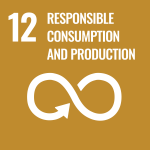
URBAN AGRICULTURE
Target: Recognize and reinforce the role of urban agriculture in advancing hands-on learning, placemaking, and beneficial social impacts
Status
- In progress
With the hard work and dedication of our many campus farmers and their advocates, urban agriculture continues to flourish on campus. Some highlights of the 2023 growing season include:
2830 m2 of land under cultivation, with 1872 m2 being dedicated to food production and 958 m2 growing primarily herbs and pollinator supporting species
Collectively, the campus gardens produced more than 10,000 portions of produce, herbs, fruits and mushrooms. The food was distributed mainly on campus, with 56% going directly to individuals through farmer’s markets or to volunteers and 44% redirected to other food service organizations such as the Hive, Le Frigo Vert and the People’s Potato
The gardens contributed greatly to increasing biodiversity on campus, growing 129 unique species made up of 30% vegetable crops, 25% herbs, 33% flowers, 5% mushrooms, and 8% fruits
The gardens also provided 584 unique experiential learning opportunities related to the urban agriculture
| Type of program | Program | Description |
|---|---|---|
| Solidarity Food Gardens | People’s Potato Community Garden |
The People's Potato community garden is a space that encourages volunteering while providing the community with access to fresh and organic vegetables. |
| Sankofa |
Sankofa is a community garden space which uses teach-ins, workshops, media projects, Black-Indigenous farming methods, gardening, storytelling and rituals to call on Africans, Afro-descendant and Black-Indigenous peoples to reclaim and seek the wisdom of their roots and their connections to the land. | |
| Education Centers |
Concordia Greenhouse |
The Greenhouse provides a welcoming, organic green space that fosters community by providing experiential learning opportunities within a year-round growing environment. As an indoor growing environment, they specialize in techniques such as aquaponics and hydroponics that are not available in outdoor environments. |
| ABCompost | ABCompost uses small scale vermicomposting methods to process organic waste from campus food providers such as Le Frigo Vert and People’s Potato. They also educate the Concordia community on different types of small-scale composting through workshops and other events. |
|
| Certificate Programs |
City Herbal Apprenticeship Program (CHAP) |
City Herbal Apprenticeship Program (CHAP) - offered through the Concordia Greenhouse. The City Herbal Apprenticeship Program is a 4-month program for anyone who wants to learn how to grow, identify, harvest, use, and apply herbs in a hands-on, collective setting. Herbal apprentices gain experience through tending to the medicinal perennial garden on the Loyola campus, making herbal medicines and attending classes led by experienced herbalists. |
| Coop CultivAction |
CultivAction is a solidarity cooperative of urban farmers working in collaboration with community organizations in Montreal and Concordia University to ensure the transition to a more sovereign food system. They offer urban agriculture workshops and community service-learning opportunities to empower people with the knowledge to grow their own food and participate in a movement to cultivate a more resilient, just and food secure future.
|
|
| Hamidou Horticulture Academy |
Provides full season training that can be taken as whole or broken up into three sections corresponding to the seasons - spring, summer and fall. The goal of this program is to train future horticulturists in organic production and marketing of fruits and vegetables, particularly ethnic, marginal, old and less commonly consumed varieties, in greenhouses and fields. |
|
| Research Gardens | Mind.Heart.Mouth - Act Living Lab Gardens |
This garden research project combines experiential learning in garden-based pedagogy and sensory experience theories to create workshops and spaces designed to increase awareness and greater connections with our natural environments and with the ways, our food is produced. |
| Ecology Projects |
Grey Nun’s garden |
The Institute of School and Community Gardens for Climate Justice reflects Prof. Mitchell McLarnon’s collaborative research and teaching program that encircles different approaches to climate change, environmental and land-based education. One slant of this research/teaching is concerned with the extent to which gardens actually achieve outcomes of environmental sustainability, and social and environmental justice. |
| Concordia Pollinators Initiative |
These gardens are host to perennial plant species native to Quebec which provide important food and habitat for local pollinator species. What once were two student-led projects are now one great opportunity, supported through the Office of Sustainability, to learn more about our native plants and pollinators — all while having fun in the gardens! |
|
| Pollen Power - Citizen Science Surveys |
Grown out of a Student Sustainability Ambassador Project, this group has combined with CPI to provide opportunities for students to try their hand at biologically surveying while contributing to the campus biodiversity survey and learning about local plants and pollinators. |
Efforts supporting this target
A new space contract system offers support and clarity to groups seeking garden space on campus
Two new three-season greenhouses erected at Loyola to support seedling production for the campus gardens, supported by Facilities Management
Establishment of a temporary greenhouse location on H7 to support the Concordia Greenhouse Project while the 13th floor greenhouse is inaccessible due a construction project in the adjacent mechanical rooms (supported by the CSU and Facilities Management)
Microgreens growing operation established in TB garage (supported by Facilities Management)
ABCompost became a working group the Concordia Greenhouse and was given space on H7 (supported by Facilities Management and Hospitality Concordia)
Fridges in RF building are made available to garden groups to store their harvest (supported by Hospitality Concordia)
Little Panther’s Community Breakfast program was piloted by Sankofa (supported by the School of Health)
New garden project at the GN being headed by the Department of Education for research
Calls to Action
- Volunteer with the Concordia gardens
Become a member of Coop CultivAction
- Visit the Concordia Farmers’ Market to get produce grown on campus or by local farmers
Related Sustainable Development Goals
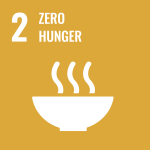
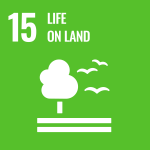
FOOD VARIETY, HEALTHY & PLANT-BASED OPTIONS
Target: Support the adoption of healthy, plant-based, allergen-free, and culturally inclusive food choices on campus
Status
- In progress
Efforts supporting this target
Campus Health & Wellness have Health promotion specialists whose work includes nutritional counselling as well as healthy eating workshops. Concordia's health promotion specialists are registered nurses who promote health and well-being. They offer personalized support for students, staff and faculty, as well as presentations, consultations and education for the entire community
The dining halls are raising awareness of plant-based food options. Two Climate Awareness weeks were organized where the menus for select stations included dishes’ greenhouse gas emissions and highlighted low-emissions menu options. A front-of-house event was offered where the chefs prepared custom, house-made vegetarian burgers.
Three of our vending machines serve fresh foods, and the snack vending machines respect a ratio of healthy snacks.
Calls to Action
Book an appointment with Concordia’s Health promotion specialists
Check out Concordia’s resources on healthy eating and nutritional services
Related Sustainable Development Goal

Target: Reduce animal product (meat, poultry, fish, seafood, eggs, dairy) purchases to 30% of the total food budget
Status
- In progress
Efforts supporting this target
23.5% of all fresh food served across Food Services retail locations are vegan
All in-house prepared baked goods are vegan
Dining hall menus consist of 42% vegan and 24% vegetarian optionsThe dairy area of the dining hall was restructured to increase visibility of plant-based options (i.e. removed 3-prong cow's milk dispenser and replaced with countertop fridge that displays plan-based milk options with dairy in an undercounter fridge below.)
Calls to action
Related Sustainable Development Goal
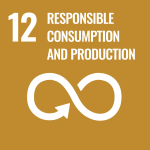
FOOD WASTE AND SOLIDARITY
Target: Reduce food waste and contribute to food security in our community
Status
- In progress
Efforts supporting this target
A student food experience survey was produced in July 2023 to assess the prevalence of student food insecurity at Concordia and to offer recommendations.
The Hive Free Lunch served over 1000 meals per week and the People's Potato served over 1,600 meals per week plus 100 food baskets every other week. Both are offered space and equipment by Concordia, with major kitchen improvements being implemented in summer 2023.
Community Cravings, a new student-initiated and CSU-managed food pantry in the Hall Building, distributed $1,000 worth of food in less than two months. Concordia Food Services donated a fridge and $6,000 was from the Sustainability Action Plan to purchase food during the 2023-24 academic year.
Hospitality Concordia’s Emergency Meal Plan Program provided $8,000 of meal plans and vouchers to students in need, disseminated through administrative unit partners at their discretion (Financial Aid and Awards Office, Campus Wellness and Support Services, Concordia University Student Parents, Student Success Centre, Otsenhákta Student Centre). This translates to approximately 300 meal plans or vouchers made available to students.
Hospitality Concordia is a partner of Tablée de Chefs, a food recovery organization that collects surplus food for local shelters. In 2023-24, the Concordia community donated about 624 servings of leftover/surplus food through the La Tablée des Chefs program.
In partnership with La Tablée des Chefs, Concordia Food Services cooked and assembled 4000 portions of food in April 2024, for donation to the Concordia University Student Parents Centre and to Resilience Montreal.
Calls to Action
- Learn more about food security resources on campus
- Get in touch with your Hospitality Concordia event coordinator (if applicable) to ensure that your event’s leftover food is donated
Support the Community Cravings pantry
Support the Student Emergency and Food Fund
Related Sustainable Development Goals

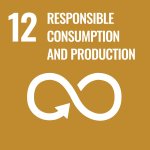
Target: Achieve Fair Trade Silver status
Status
- Complete
Efforts supporting this target
- Increasing the diversity of our Steering Committee by bringing on more campus stakeholders
- Incuding Fair Trade procurement for Fair Trade coffee, tea, and sugar as a requirement for all food service and approved caterer contracts
- Working with our BookStop locations to bring in numerous new Fair Trade-certified products (apparel as well as chocolate)
- Including Fair Trade requirements into our snack vending machine contract
- Engaging with tenants and independent food locations to identify opportunities to sell Fair Trade products in place of their existing ones. This process is ongoing – we continue to do more.
- Developing and hiring a coordinator to manage a Fair Trade Ambassadors volunteer program through the Student Sustainability Ambassadors Program
- Working with student groups to add information about Fair Trade onto their websites
Achieving Silver Status represents how Concordia is constantly strengthening its commitment to principles of ethical procurement and sustainability. Currently, there are only three other campuses in Canada who have achieved Silver Status: York, UTM, and McGill.
Stingers Roast coffee
- In 2022, we launched Stingers Roast, our own signature coffee blend, sourced from women-owned cooperatives in Nariño, Colombia.
- This past May, we invested in our first ever Origin Trip: three Concordia students had the opportunity to visit the cooperative, connect with farmers, and better understand the labour that goes into coffee production. This trip was supported by funds collected through sales of Stingers Roast.
- Two vending machines, operated by a student owned business, serve Stingers Roast Fairtrade coffee.
Calls to Action
Purchase Fair Trade Stingers Roast coffee for your office or home!
Learn more about Concordia’s commitments to Fair Trade
- Become a Fair Trade Ambassador through the Student Sustainability Ambassador Program
Related Sustainable Development Goal
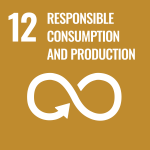
EXPERIENTIAL LEARNING
Target: Create an environment where community members can learn about food, from seed to plate, and offer students hands-on learning opportunities through projects that improve the campus food system
Status
- In progress
Full season gardening programs
City Herbal Apprenticeship Program (CHAP) - offered through the Concordia Greenhouse. The City Herbal Apprenticeship Program is a 4-month program for anyone who wants to learn how to grow, identify, harvest, use, and apply herbs in a hands-on, collective setting. Herbal apprentices gain experience through tending to the medicinal perennial garden on the Loyola campus, making herbal medicines and attending classes led by experienced herbalists.
Offers three programs that can be a stand alone courses or combine all three to receive a certificate. The certificate consists of three programs to provide you with the knowledge, skills, practical experience, and critical understanding to create positive changes in your local food system.
Program 1. Cultivating Urban Greenspaces
Program 2. Guided Hands-on learning experience
Program 3. Critical Food Studies Reading Group
Provides full season training that can be taken as whole or broken up into three sections corresponding to the seasons - spring, summer and fall. The goal of this program is to train future horticulturists in organic production and marketing of fruits and vegetables, particularly ethnic, marginal, old and less commonly consumed varieties, in greenhouses and fields.
Education Centers
The Greenhouse provides a welcoming, organic green space that fosters community by providing experiential learning opportunities within a year-round growing environment. As an indoor growing environment, they specialize in techniques such as aquaponics and hydroponics that are not available in outdoor environments.
Community Gardens
Sankofa (New Garden) is a community garden space which uses teach-ins, workshops, media projects, Black-Indigenous farming methods, gardening, storytelling and rituals to call on Africans, Afro-descendant and Black-Indigenous peoples to reclaim and seek the wisdom of their roots and their connections to the land.
The People's Potato community garden is a space that encourages volunteering while providing the community with access to fresh and organic vegetables.
The back garden of the Grey Nuns Residence on Concordia’s Sir George Williams Campus has reopened to the university community, providing a downtown urban oasis to students, faculty and staff.
Ecology Projects
These gardens are host to perennial plant species native to Quebec which provide important food and habitat for local pollinator species. What once were two student-led projects are now one great opportunity to learn more about our native plants and pollinators — all while having fun in the gardens!
Another amazing initiative that has grown out of a Student Sustainability Ambassador Project, this group has combined with CPI to provide opportunities for students to try their hand at biologically surveying while contributing to the campus biodiversity survey and learning about local plants and pollinators.
The Concordia Tree Project aims to provide the opportunity for members of our community and the general public to learn about the wealth of trees we have on campus. The project is designed to provide a growing body of information at the species and the individual tree level. The goal is to put labels with QR codes on every campus tree in Kanien’kéha, English and French. These QR codes will lead to species-specific information on each individual tree.
Peer-to-Peer Education Programs
The Sustainability Ambassadors Program (SAP) provides students with an immersive sustainability leadership experience. It provides creative engagement opportunities that build students’ skills and competencies as they support a culture of sustainability on campus.
The Employee Sustainability Ambassadors Program is a volunteer opportunity offered through the Office of Sustainability and recognized by the university. As a Sustainability Ambassador you’ll have support in increasing the sustainability of your department. Through peer-to-peer activities, you can help bring about a positive culture change at the university.
For credit courses
Provided by Cultivaction Solidarity Cooperative of Urban Farmers. This course is for adults of all ages who want to learn how to grow nutritious food in an urban setting. Whether you are looking to transform your property into an edible garden, learn how to maintain a community garden, or you want to improve your existing gardening skills, this course will provide you with theoretical knowledge and practical skills to support your journey towards becoming more self-sufficient.
This course examines the history and practice of producing food in cities. Students will explore the tensions between the politics, economies and ecologies that organize urban food production and the everyday ways people raise and access food in varied urban contexts. The course also critically evaluates food‑based social movements: their limits, possibilities and connections to wider struggles for socio‑economic justice.
Real World Project managed as a Capstone projects involving real client organizations in agri-food, 5 to 9 guest speakers from industry, each discussing real and recent projects in agri-food marketing; 1 to 2 case studies each term; industry-focused weekly readings. In partnership with this course, Concordia Food Services developed a marketing campaign for Fair Trade and Stingers Roast.
This course examines food cultures and food rituals and explores religious meanings and the making of religious identities. The preparing and sharing of food defines religious community and expresses religious values. In looking at food in several world religions, this course focuses on how food can serve as a medium of transmission and transaction, and on the roles that women and men, gods and ancestors, and other beings and forces have in this network.
This course examines food cultures and food rituals and explores religious meanings and the making of religious identities. The preparing and sharing of food defines religious community and expresses religious values. In looking at food in several world religions, this course focuses on how food can serve as a medium of transmission and transaction, and on the roles that women and men, gods and ancestors, and other beings and forces have in this network.
Calls to action
Register for courses above and check out the campus gardens website for more hands-on opportunities to learn about the campus food system
Related Sustainable Development Goal
